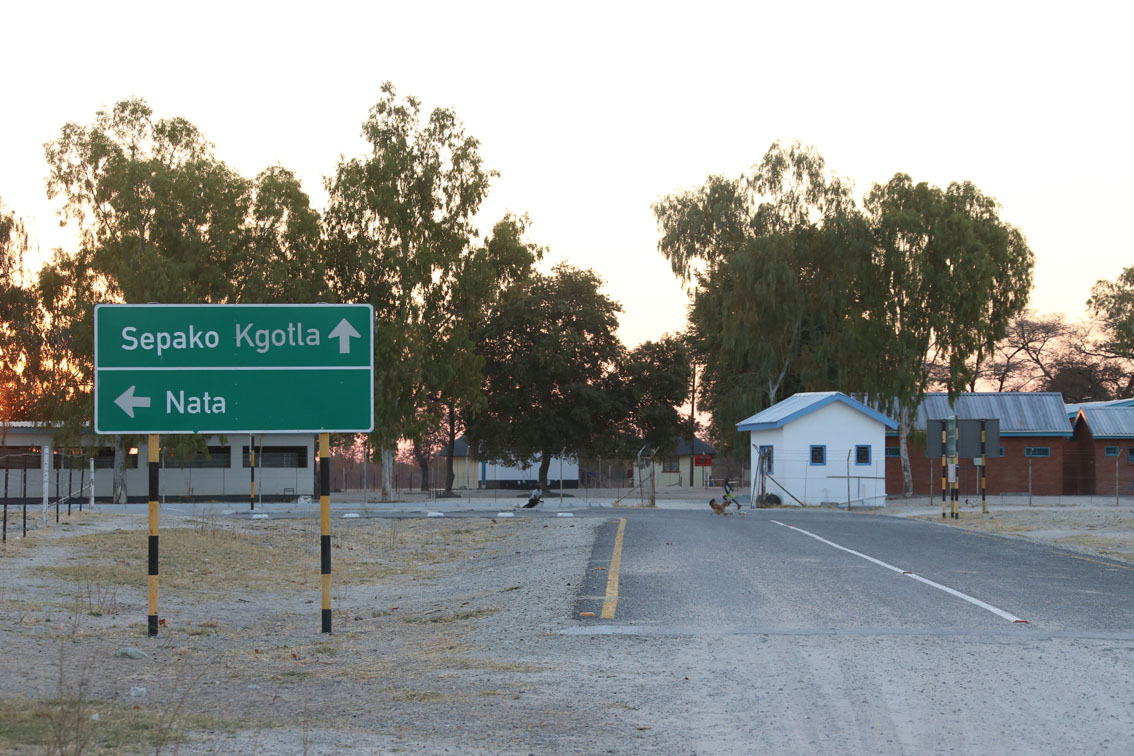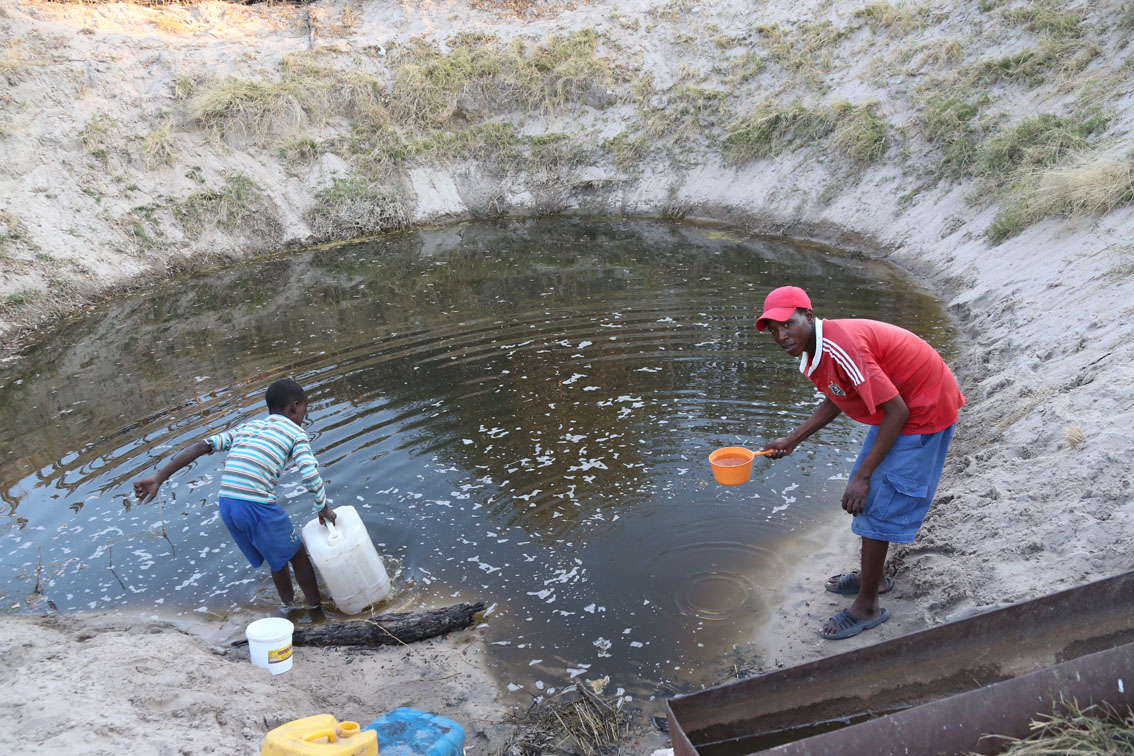Battle against menacing elephants
02 Sep 2014
Serene peace permeates the small village 50 kilometres on the north-eastern side of Nata on the edges of the Botswana-Zimbabwe border.
The demeanour can be discerned from local residents as they go about their daily errands, an air of security hangs in the atmosphere as the traditional way of life takes shape involving both parents and children.
Young boys and girls running around playing games while their parents and eldest children traverse the village and disappear into the of bushes around the village to forage for one necessity after the other.
The bushes bordering the life supporting Tsibanana River are a source of livelihoods for residents of Sepako providing them with firewood and other edible wild fruits.
The river itself cuts the village into two halves with the other side on the far east accessible either by car, donkey cart or foot depending on what residents can afford.
During the rainy season, residents on the other side cannot cross the river as there is no bridge. Students also miss school and only get help from the Botswana Defence Force which usually deploys boats to enable them to cross.
The western part of the village is more developed with modern houses, a primary school, health post, the kgotla and offices for the Department of Wildlife and National Parks while the eastern part is less developed characterised by grass thatched mud huts, a sign of some economic stratification and the inequality that is evident even amongst poor rural villages around the country.
In a minute, a roaring engine and cranking sounds of a weather beaten automobile can be heard from a distance and soon it appears to cross the dry river bed without any difficulty at this time of the year headed to cattle posts in Semataphiri along the Nata River.
The car has seen its better days, a Chevrolet from yesteryear, the 1970s to be precise, and both the owner, an old man, and its passengers must be praying that it manages to conquer the rough terrain and any other challenge that nature throws at it to arrive at its destination to deliver food for the herd boys and some supplements for livestock with the dry season setting in.
On the banks of the Tsibanana river residents have come up with innovative ways to dig wells where they fetch fresh water for domestic use and also water their cattle.
Despite the fact that the council has drilled a borehole to supply residents with water, they detest this as the water is apparently salty and not suitable for human consumption.
During this time of the year parents send their children to collect water from the open air wells without worrying about an encounter with uninvited guests, especially jumbos and buffaloes which frequent the area to quench their thirst.
The reason is that during this time of the year there is plenty of water all over the place, hence competition is minimal, but come the dry season the battle for the water intensifies.
As water sources in the forest dry up elephants start their trek to Sepako wells where they cause irreparable harm to the efforts of the residents in the process endangering their lives.
Once they take over the wells it only takes the intervention of wildlife officers or armed residents to chase them away, a constant feature in their calendar and an indicator of how human wildlife conflict is a reality in Sepako.
The concern for residents is that these huge creatures don’t only drink water but they also vandalise the wells which takes a lot of labour to return it to its original state.
When this happens residents are required by law to report to the wildlife authorities but sometimes even this is not enough as elephants mostly visit at night.
The presence of these dangerous animals also restricts the movement of people from one side of the river to the other.
“During the day after drinking water they can also pass through the village which is dangerous and if two of them descend on our well they would be no water left as they take large amounts,” says Simisani Biki ,a young girl who we find fetching water.
The elephants are truly a nuisance to the residents as another girl, Kelebonye Mhlambi explains.
She says that the most dangerous elephants are those with young calves as they are aggressive.
Not only do elephants cause problems at the water sources, after the ploughing season they are known to have come and destroyed and eaten all the crops leaving farmers empty handed and on the throes of poverty and destitution.
“Once they arrive in the village we can spend the whole day without watering our cattle. The wildlife rangers also assist by guarding the wells but we are also allowed to kill them when they endanger our lives,” opined Richard John.
Also, he says that it’s not only elephants that cause mayhem in the village as the hyena strikes their animals even during the day.
“Once we see cattle running back towards the village we know that a hyena is lurking in the horizon. We are under siege,” said John.
He also explains that farmers who don’t have guns are at the mercy of wild animals, especially elephants and said that during summer months they don’t sleep at night as they take turns to camp at the wells guarding their precious water.
An elderly woman, Geben Maqatha who lives on the other side of the river also said that during summer months elephants cause lots of problems and endangered their lives especially when they try to water their cattle at Semataphiri cattle post.
Kgosi Joseph Ramaditse of Sepako knows fully well that despite the peace that reigns within the village during this time of the year, it is only for a brief period and soon the battle will begin.
He knows what he is talking about and has fought countless battles with authorities over the issue.
“As we approach the summer months we are preparing for a battle in our hands, last year less than ten elephants were killed after encroaching into the resident’s space and endangering their lives,” he said.
Kgosi Ramaditse said that despite the wildlife department’s attempts to drill boreholes for elephants far away from the village near Ngwasha to reduce human-wildlife conflict the elephants kept coming back to vandalise their wells and posing a risk to their safety.
He said that once elephants invade the village people live in fear of being attacked. ENDS
Source : BOPA
Author : Puso Kedidimetse
Location : FRANCISTOWN
Event : Village profile
Date : 02 Sep 2014








